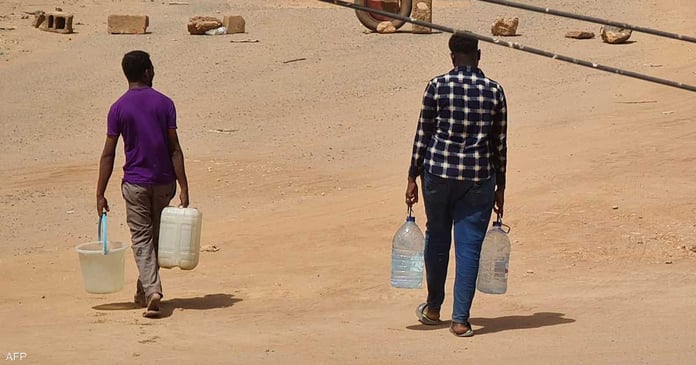When Mahmoud goes out to buy food, he does not take his cell phone with him because of the large number of thieves in the streets. He spends most of his time in his house, waiting for an artillery shell to explode at any moment.
Unable to flee the conflict-ravaged capital, this exhausted and troubled young man tries to create a world of his own: “I’m reading my collection of books for the second time”, he says.
Among the books that have helped him is Models of the Mind, a 2021 neuroscience book about how math can help explain how the brain works.
Since the outbreak of the conflict last month, more than 1.3 million people have fled the fighting in Sudan, making their way to other parts of the country or crossing borders.
But millions of people remain stuck in Khartoum and Omdurman, unable to leave the main battleground between the Sudanese army and the RSF.
For them, every day is a struggle to get food and water and to charge their phones when the electricity goes out.
All the while, they must avoid street fighters and thieves who rob pedestrians, loot shops, and break into homes to steal valuables.
money problem
On the one hand, the dollar has become a rare currency, and on the other hand, it has become dangerous to keep it, because it is a target for thieves. Amazingly, the Bank of Khartoum online app works most of the time so it has become a lifeline for many as it allows its users to transfer money and make payments electronically .
Mahmoud uses the app to pay for the one store he goes to for packaged food. During the weeks when the electricity was out, the shopkeeper gave him what he needed and allowed him to pay later.
The tech company where Mahmoud was employed before the fighting broke out pays 30,000 Sudanese pounds, or about $50, into his account on the app every few weeks.
The transfer allows him to buy food. “If I have money in my bank account and the Bank of Khartoum app is working, it’s fine,” he says.
Like others who spoke to The Associated Press, Mahmoud asked that his full name not be used for fear of reprisal.
Stay or go?
Many don’t have the upfront cost, either internally or externally. Mahmoud, for example, wants to go to Ethiopia, and from there to Portugal, where he has been offered a suitable job. But he doesn’t have the $2,500 the trip cost him. While Walid said he couldn’t leave for health reasons.
Others say they have no choice but to stay, like Tana Tosafi, one of many women selling tea in the streets of Khartoum, a single mother from Ethiopia, who says her four children depend on her.
On a separate note, Walid says there is only one bakery left to serve the neighborhood he lives in, and two more.
To receive the bread, each person must register their name in advance. “If you’re lucky and register your name at seven o’clock in the morning, you can have bread at twelve o’clock in the afternoon,” he added.
Walid, meanwhile, lives on the Bank of Khartoum app, where his family, who reside in Saudi Arabia, deposits money into his account.
During the first weeks of May, his neighborhood had no electricity, so he relied on a nearby mosque with a generator to charge his phone. However, the lack of electricity means there is no running water.
“We were walking around the neighborhood with buckets, hoping to find someone with a generator who could run the water pumps,” he says. Last week, electricity was restored to the neighborhood.
Most of the city’s hospitals are closed and many have been damaged by shelling or fighting.
According to the World Health Organization, since May 11, there have been 11 attacks on humanitarian facilities in the capital.
Community associations, led in part by the network of resistance committees, have banded together to help treat patients in Khartoum and deliver medicine.
Hadeel Abdel-Sayed, a doctor at a community clinic, says patients are dying because there isn’t enough oxygen. Eventually, the clinic was closed and patients were evacuated due to intense shelling.
Mahmoud thinks that if he somehow manages to collect the money, he will try to carry out his escape plan to Ethiopia. But time is running out: “My passport will expire in 10 weeks, so I have to leave before,” he says.
Read the Latest World News Today on The Eastern Herald.


